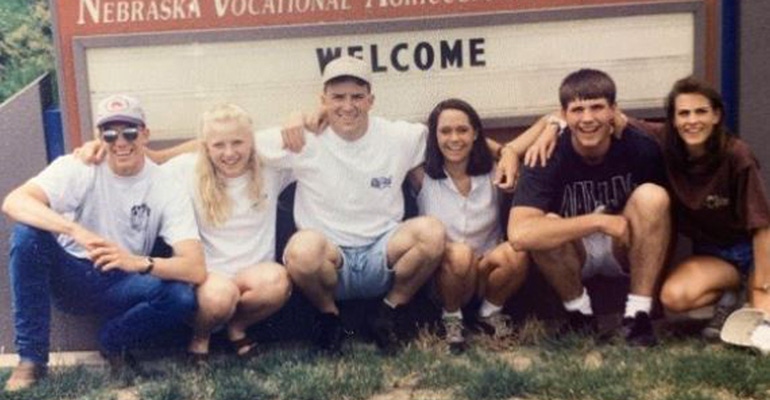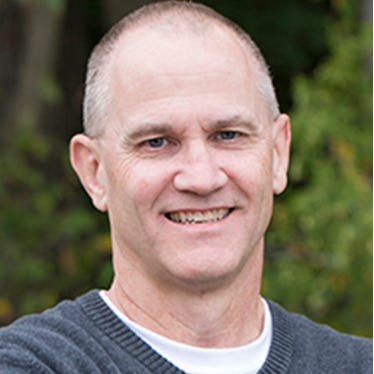
Editor’s note: This is the second part of an eight-story series on catching up with the South Dakota state FFA officer team 25 years after their retiring addresses.
Twenty-five years has given the South Dakota state FFA officer team of 1995-96 a lot of time to ponder what the organization has meant to them and how it has shaped their lives. That time has also allowed them to establish their lives and careers, and develop knowledge to pass along to today’s FFA members.
“I just think about the opportunities that I had through FFA and the things that I took advantage of,” says Dusty Oedekoven, vice president of the 1995-96 team. “I often think about just what a benefit that I had through FFA and with all of you, and I wouldn’t have traded it for anything,” he says of his fellow state officers.
Part 1: Former SD state FFA officers look back
As of yet, he hasn’t encouraged his five children to follow the same path. “But there are other things to be involved in and other opportunities, too,” he says.
Oedekoven has given back to FFA, serving on the state officer selection team a couple years ago.
“It was a good reminder of that intensity and the emotions of that whole process to see young people going through that,” he says. “In addition, it did call back memories to just how nerve-racking that process is.”
Mentoring others
Though she has stepped away from FFA, former president Janelle Olesen has still influenced FFA members. One young lady whom she coached in track served as a state officer in Iowa this past year.
“Unfortunately, with COVID and everything, she didn’t get that full officer experience,” Olesen says. However, she says the two talked about “seizing this moment” and the position being an opportunity “very few kids get at this age.”
“The people that we were able to network with and the career connections we were able to make” as officers — “I think that’s just invaluable,” Olesen says.
Craig Winquist, former treasurer, uses his position as ag teacher to demonstrate the opportunities that lay ahead of his students if they so choose. He says his 14-year-old son, Corbin, has joined FFA in Canton, S.D., and can’t wait to wear the blue jacket.
“I can’t help but be filled with pride with that,” Winquist says about his son. “But I don’t want to tie that to the expectations. I just want them to know there’s opportunities out there. And whatever gives them that fire in their belly, that’s what you need to follow. You’ve got to find something that motivates you, and for me, that’s what FFA did.”
Due credit given
Career paths can have twists and turns, and Carrie Vugteveen, former sentinel, believes her path would have been quite different had it not been for FFA.
“I believe that my opportunity as a state officer brought me to where I am today, really, in terms of my career,” she says. “Professional networking, and the ability to express and learn more about your own leadership qualities helped me get my very first professional position out of college. I really truly believe that — which set me down the whole path of life.”
Sometimes, it takes someone else or an organization to bring out the best in us, and former reporter Suzie Behlings found that in FFA.
Becoming a state officer, “I wasn’t completely confident,” she recalls. “I know going in it seemed like a big, big undertaking for me, but I think sometimes other people see more in you than you see in yourself. And I think that’s one of the really good things about FFA.”
Behlings credits her FFA advisor, Craig Shyrock, for being “a really supportive instructor who really cared and was invested in the students that he worked with.”
“FFA experiences provided leadership skills and confidence that have helped me to be successful in my career,” she says. “Learning to be part of a team and to set high goals provided valuable life skills as well.”
Jon Petersen, former secretary, can’t say his current career would not have happened without FFA involvement, but he knows his life would be different.
“The friendships and associations that you make with other people through the FFA organization — a lot of those people are still in my circle of people,” he says. “FFA is a common bond among several of those people in my closest business and social circles. We all go our own way within different career paths as we mature, have families and live our lives.
“But the FFA is a common denominator among us — no matter what your views, the current events in the media or political mainstream. We believe in the future of agriculture, and we believe we can be an influence in our homes and communities to make an impact for future generations.”
About the Author(s)
You May Also Like






